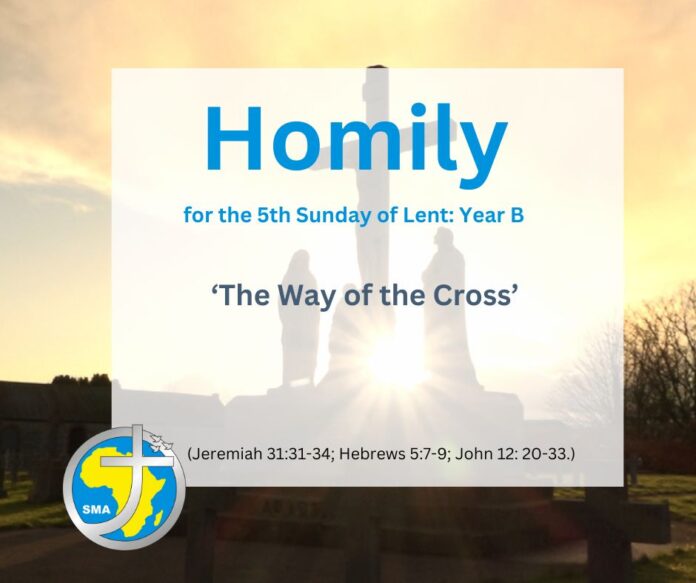Readings: Jeremiah 31:31-34; Hebrews 5:7-9; John 12: 20-33
Theme: The Way of the Cross
As we continue our Lenten journey with Christ, the human face of God, today’s readings remind us of the painful struggle Jesus had to endure to be faithful to his vocation as suffering Messiah. As we saw on the first Sunday in Lent in the story of the temptations, Jesus had to decide how he would fulfil his messianic vocation. From the beginning of his ministry he chose the path of suffering love, the way of the Cross. Both the second reading from the Letter to the Hebrews and the Gospel give us an insight into what this would cost him.
The Letter to the Hebrews tells us that, ‘Although he was Son, he learnt to obey through suffering’ (Hebrews 5:8). The gospel reveals Jesus’ inner struggle as the time of his passion and death draws near: ‘Now the hour has come… now my soul is troubled’ (Jn 12: 27). We have here an echo of Jesus’ agony in the Garden of Gethsemane where he seemed appalled at the prospect of his forthcoming death and prays to his Father: ‘Take this cup away from me’ (Mk 14: 36). John’s account of this harrowing moment is less stark: ‘What shall I say: Father, save me from this hour? (Jn 12:27). Jesus’ fear reveals his humanity. Fear is natural. As Alexander Solzhenitsyn states: ‘A person without fear is no hero; the person who overcomes fear is. Jesus’ trepidation is followed immediately by his humble submission to the Father’s will: ‘It was for this very reason that I have come to this hour. Father, glorify your name! (Jn 12: 27).
Jesus knows that his death is necessary and he embraces it freely. It is his supreme witness to his Father’s love, the climax of his life-giving mission: ‘Unless the grain of wheat falls on the ground and dies, it remains a single grain, but if it dies it bears much fruit’ (Jn 12:24). This declaration may, at first sight, seem to conflict with Jesus’ earlier affirmation of the life-giving nature of his mission: ‘I have come have come so that they may have life and have it to the full’ (Jn 10:10). It is indeed a paradox and a deeply counter-cultural one. But it expresses a profound truth at the heart of life and a key principle of all Christian discipleship. To try to avoid death, including the ‘little deaths’ that are part of everyday living, is to stunt our growth in love and suffocate the Spirit. From the moment we are born until the moment of our physical death, we experience many ‘deaths’, beginning with our departure from the comfort and warmth of our mother’s womb. Our lives are inscribed with a series of ‘deaths’, losses and renunciations – in our relationships, in our career goals, in our hopes and expectations. An it is from these ‘little deaths’ that we learn to change, to adapt and make new gains.
A few years ago, I tuned into a BBC programme on old age and listened to an 82 years old Asian woman being interviewed about her life. She was asked the question: What in your opinion are the most important ingredients for a happy life?. Two things she said struck me: ‘Let go of being needful of the approval of others’ and ‘Don’t be afraid of death. If you’re afraid of death you will never live. Ilia Delio says that every time we try to hold on too tightly to our comfort and security, every time we try to control our lives to avoid risk, we reject the movement of God’s Spirit in our lives. ‘To say “I will not die” is to die. To be willing to die by surrendering to the freedom of the Spirit is to live forever’ (Making all Things New, p. 82).
Jesus’ challenge to us is clear. It is to die to self and imitate his own life-giving service: ‘The one who serves me must follow me. Wherever I am, my servant will be there too (Jn 12:27). To follow Christ is to choose to walk with him through ‘thick and thin’, in good times and bad. It is to travel with him all the way to the Cross. And this way, as Pope Francis reminds us, is the way of de-entering and transcending. ‘We have to leave behind the “selfie” culture and look at the eyes, faces, hands and needs of those around us; and in this way find, too, our own faces, our own hands, full of possibilities.’ I will end with an apt reflection from the pen of Flor McCarthy, SDB, entitled ‘A Grain of Wheat must Die’:
Each of us is like a grain of wheat planted by God.
Just as the grain of wheat must die to produce a harvest,
so we must die to self in order to bear the fruits of love.
This dying to self is a gradual process and happens in little ways.
Every act of humility involves dying to pride.
Every act of courage involves dying to cowardice.
Every act of kindness involves dying to cruelty.
Every act of love involves dying to selfishness.
Thus the false self dies, and the true self,
made in God’s image, is born and nurtured.
It is by giving that we receive;
It is by forgiving that we are forgiven;
It is by dying that we are born to eternal life.
Michael McCabe SMA
Click on the play button below to listen to an alternative homily from Fr Tom Casey SMA.
|
|

